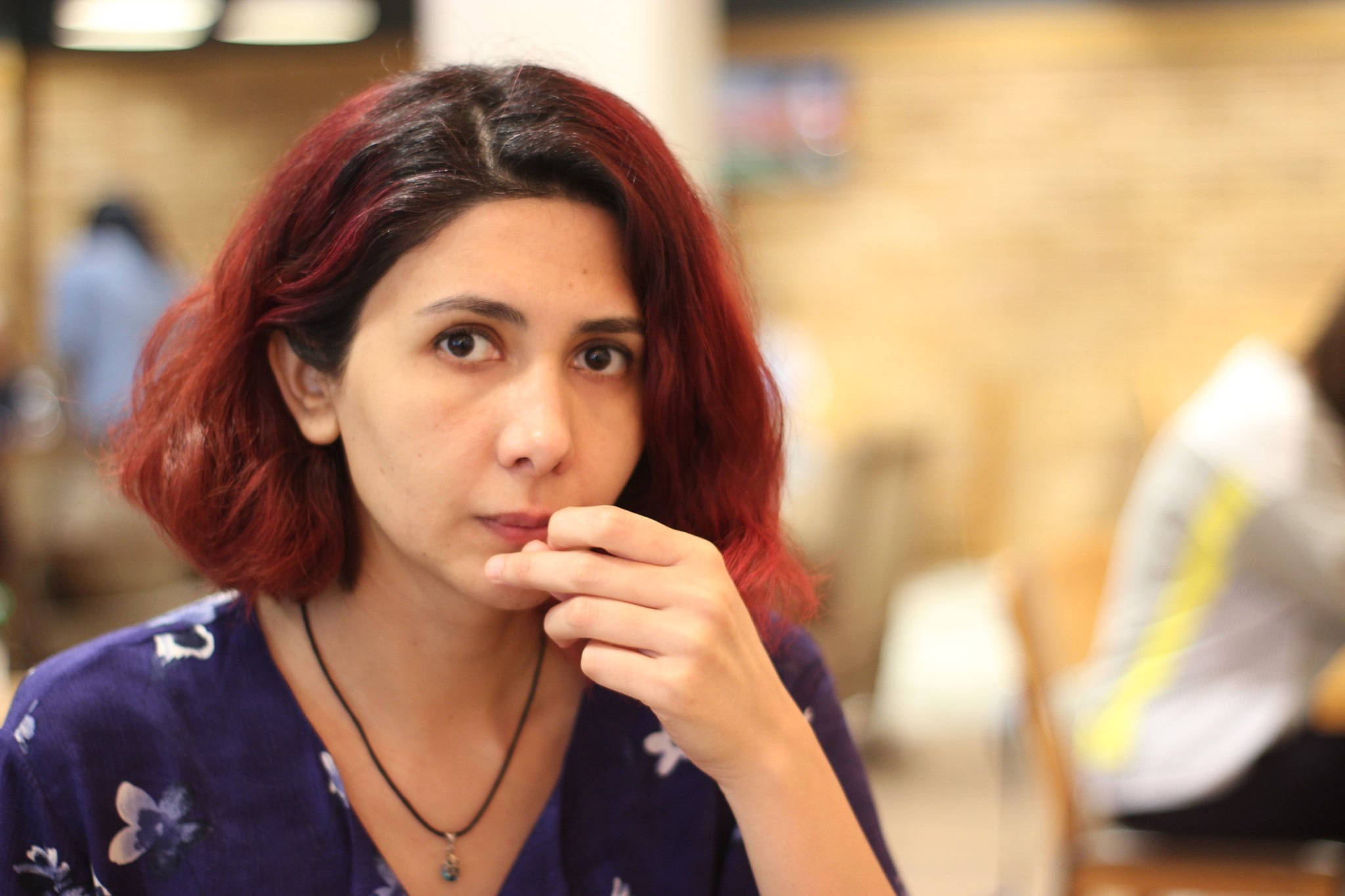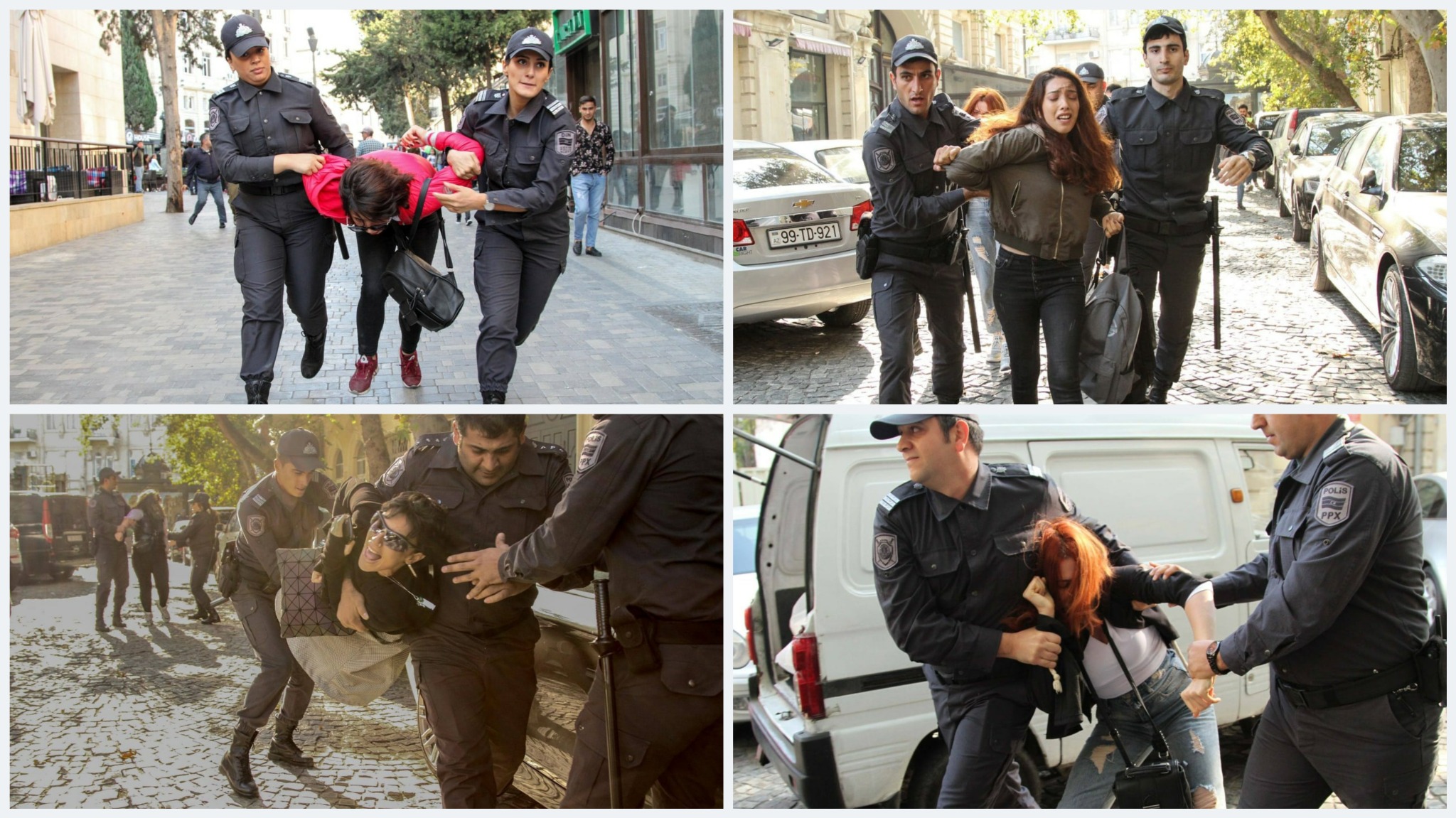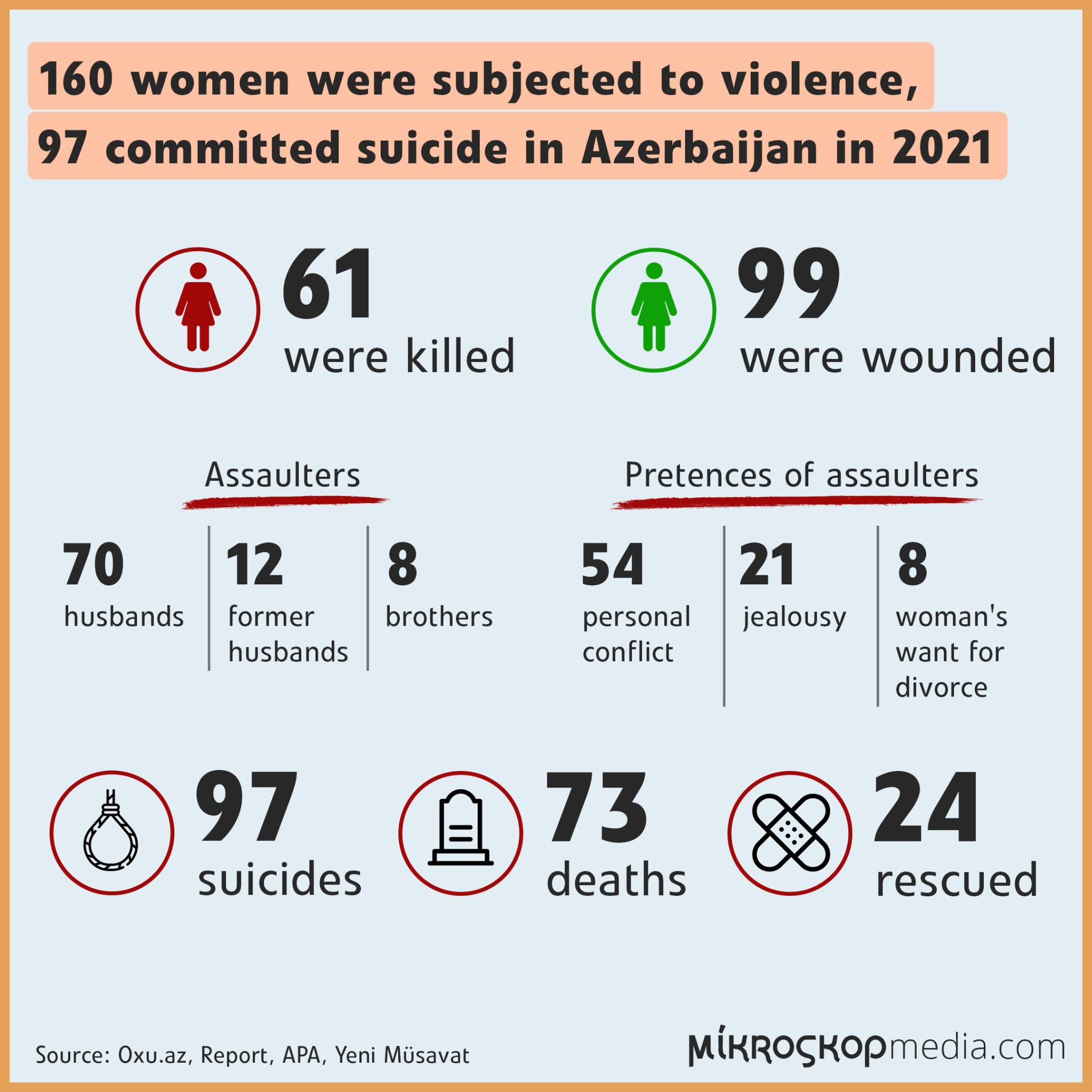To what extent it is challenging being a feminist activist in Azerbaijan as the movement is developing recently
The story of feminist activists in Azerbaijan is hard: while protesting domestic violence and femicide in the country, they have to deal with total surveillance: pressure from the authorities, harassment and hatred from strangers.

Gulnara Mehdiyeva, a gender activist in Azerbaijan says activism in her country puts a person under intense scrutiny.
“Everything, especially personal life, is scrutinized: my social media accounts, personal information, and audio files detailing my mental health issues were all hacked and made public," she recalls.
Mehdiyeva has been actively fighting for women’s rights since 2014, but since 2019, when she has participated in organized feminist protests and rallies, her life has been under constant pressure from the State authorities.
What is going on with Azerbaijani feminists? Who are they?
What phases of development underwent the Azerbaijani feminist movement?
Mehdiyeva represents a growing group of women who identify themselves as feminists in the country. Feminist activists are raising awareness of the high femicide rates, domestic violence, sexism and homophobia by attending and following court cases and demanding justice for women who have been subjected to violence, mostly by their family members.
According to Mehdiyeva, it is vital to continue such activities in Azerbaijan to form public opinion, which has a significant role in obtaining fair court decisions.
The government of Azerbaijan has not signed and ratified the Istanbul Convention, which requires legislation that protects women from being blackmailed, beaten, and killed. The Council of Europe Convention on preventing and combating violence against women and domestic violence, also as known as the Istanbul Convention, was adopted on May 26, 2011, by the Parliamentary Assembly of the Council of Europe (PACE) in Istanbul. The Convention includes methods for preventing violence against women, protecting victims subjected to domestic violence, bringing perpetrators to justice, and improving national legislation to ensure effective protection.
The attitude of individuals working at law enforcement agencies toward women is often negative and can be tragic: Mehdiyeva says most police responses to victims who complain about violence are: “he is your husband, that means he has the right to beat you.”
Mehdiyeva emphasizes most women are not aware of their rights. Feminists provide them with legal assistance and help the victims get justice.
It is not easy for feminist activists to protest or protect women, since they face pressure and violence against themselves from the government and society. Their personal accounts on social media are often hacked, and their personal conversations, photos, and videos are leaked through different mediums.
Mehdiyeva says government-funded media outlets frequently publish materials against feminists aiming to discredit them. Slogans of feminist protests and rallies are presented to their audiences as ideas against local customs and historical traditions. It raises anger in society against them.
In spite of those challenges, feminists hold rallies every year on March 8 (International Women’s Day) and protest particular cases of violence in the country.
The feminism movement has been active since the 1990s when Azerbaijan attained independence. New organizations and associations for women's rights were founded along with diverse political parties and independent newspapers and other media. In contrast to the closed atmosphere of the USSR, international ties were established. Funds from foreign organisations contributed to the founding of diverse non-governmental groups. These non-governmental organizations—many of which were NGOs devoted to women's rights—have changed civil society over time.
According to the “Report” Information agency, on August 11, 2021, the Ministry of Justice officially announced that 3,332 non-governmental organizations had been registered in Azerbaijan. By the end of 2021, there were over 3,500 registered NGOs, of which 4% were focused on women's rights, according to a representative of the Ministry of Justice. According to the news portal Anews, in 2021 more than 147 NGOs have been working to advance women's rights in Azerbaijan.
Vafa Rustam, a human rights advocate, says the feminist movement in Azerbaijan started much earlier, despite the absence of an organized feminist organization in the country.
“Women staged a protest on the Boulevard (in Baku) at the start of the 20th century calling for higher pay. Equal pay for men and women is a feminist demand,” she says.
For a long time, the activities of these NGOs were limited to the organization of training, round table discussions, prevention of selective abortion and equal access to education for women. The country's female activists avoided labelling themselves as feminists for a long time.
“Although during the 1990s gender equality and women’s emancipation were central to the academic community in Azerbaijan, many avoided identifying themselves with the global feminist movement. In fact, these scholars were more comfortable identifying themselves as ‘genderologists’ or experts in gender studies”(Aliyeva, Y. G. (2020).
Women have been hesitant to publicly declare that they are feminists for a variety of reasons, one of which being the stereotype of a "feminist" that exists in Azerbaijani society. When asking whether there is a feminist movement in Azerbaijan, Sinead Walsh who received her PhD in women’s activism from Trinity College in Dublin says people typically expect a more structured movement with a manifesto.
Apart from that, the feminist movement in their minds is represented by Femen and Pussy Riot. Regardless of what they may think of these movements, that is how these people view feminism. (Feminism in Azerbaijan: Gender, Community, and Nation-Building, Sinead Walsh).
FEMEN is a Ukrainian feminist organisation known internationally for their topless protests against different issues, like sex tourism, religious institutions, sexism, homophobia, etc. They aimed to protest not only national topics but also international issues that women are subjected to.
As like FEMEN Pussy Riot also constantly faces arrests and preventing to held protests. Feminist performence art group was founded in Moscow and besides the feminism they protested president Vladimir Putin as well.
A new generation of female activists is unafraid to publicly support the feminist movement and more openly identify as feminists. (Aliyeva, Y. G. (2020) Unlike their predecessors, they carried out a variety of activities, including protests, marches, and open demands, similar to feminist groups in other countries. Although these young feminist women face various types of pressure and persecution, since 2019, a feminist rally is also held every year on March 8 (International Women's Day).

Protests are conducted in front of the Ministry of Labor and Social Protection of the Population building, where the statue of a liberated woman is located. The march “Go Against Violence” was organised on March 8, 2020, to raise awareness of violence against women.
These processions eventually became common. "Free streets are Ours" and "Unite women, There is an uprising!" have been the slogans for the marches.
A march was held on March 8, 2021, in the heart of Baku. Dozens of feminist movement activists participated in the march and spoke out about their goals. The police at all such marches take the protesters' posters from their hands and disperse the crowd. The outcome of the 2022 action was quite similar.
Since 2019, feminists have planned protests and campaigns to raise awareness of specific situations and call for thorough investigations. Several feminist activists organised one such march on February 4, 2021, with the theme "Femicide is Political." The protest was organised to call for an investigation into the cases of brutally killed women and to denounce the country's State Committee on Family, Women, and Children for its inaction. The live broadcast from the protest by Mikroskop Media identified how Policemen stopped the march and kept feminists away from the area.
According to Azerbaijani law, any march, action, picketing, or other protests must provide full details about the event and its organiser to the local government. While the law states that no permission is required, in practice the Baku City Executive Authority does not view opposition party representatives and other individuals' announcements about the actions as appropriate, and in the official response it sends to applicants, it states that the protest cannot be held on that day and in that location.
As a result, feminist marches and demonstrations are held without authorization and are usually violently broken up by police.
What obstacles must feminist activists in Azerbaijan overcome?
Feminists are subjected to various attacks not only during protests but also before and after, including publicizing and discussing information about the personal lives of the organizers and participants.
The government often tries to discredit feminists as people who lead a lifestyle that does not correspond to the customs of Azerbaijani society. As a result, there is societal pressure against feminists. One of the most common reactions of ordinary people regarding feminists is that they are dishonest and their only aim is to destroy traditional Azerbaijani family institutions. Such people support police who behave brutally toward feminist activists during the protests because they think that feminists deserve it.
Mehdiyeva has faced this many times. After her personal profile was hacked, information about her was shared and discussed on various Facebook pages. In addition to direct pressure, a new form of pressure has recently appeared. Mehdiyeva says police put pressure on activists who protect and help abused women through relatives:
The police themselves give your address to a criminal and put pressure on you through that person.
"Sometimes when we protect the victim, it affects the victim's relatives more because she has joined the feminists, and the abuser is even angrier when he hears this. So many bad things have been said about us that some feminists feel pressure from their families. A girl who participated in one of the marches was told by family members that we thought her husband was jealous, but he was not, and you put us to shame. That girl was marching just to demand basic rights, and her family told her to ‘think of us as dead’."
Narmin Shahmarzade, another rally organizer, has experienced various forms of pressure. Personal conversations with her acquaintances and friends, and images of a feminist activist whose Facebook page was taken over, were made public a few days prior to a 2021 feminist protest. (2021; Turan Information Agency) Those images and screenshots of personal conversations were sent through numerous Telegram groups.
There are numerous Facebook pages and Telegram groups that circulate misleading news to give feminists a bad reputation, in addition to the media that tries to discredit them.
Government-funded media organizations follow the government's instructions. Another group is troll teams which routinely post comments on social media posts, especially on Facebook, about feminist activism and primarily draw attention to the funding sources for feminists, which are various feminist organizations and foundations in the member states of the European Union. Feminists aren't the only group that troll teams target; they also target political party members and independent media outlets. According to "The Guardian" investigation, which was published on 13 April 2021, these trolls are paid by the government, and despite Facebook managers being made aware of the problem, nothing changed.
Mehdiyeva says pressure comes not only from the government but also from society. She says because she is not close with her relatives, she did not feel this pressure, but the situation is different for other activists. Strangers write insulting comments to her on social networks, and in interviews and reports about her in the media. The impact on her everyday life is inevitable:
"Sometimes I forget that I am being followed by both the government and activists and individuals who do not like me. You want to write something half-joking, half-serious like an ordinary person, but you see that a post that you think will be passed over is screened and shared everywhere. If you were an ordinary person, that post would not attract anyone's attention, but because you are an activist, it creates extra interest."
In an interview of her with Jam News, Mehdiyeva says she currently manages a YouTube channel called "Fem-utopia". According to her, "Fem-Utopia" is the first online feminist channel in Azerbaijan that produces educational videos in the Azerbaijani language.
How successful is the country's legal system in protecting women?
Through platforms like "Fem-utopia" and news and interviews published in different media, feminists clarify their demands. Since the general public is unfamiliar with these topics, they are either not understood or do not draw attention. For instance, widespread discussion of the Istanbul Convention started concurrently with the growth of the feminist movement in Azerbaijan. According to human rights activist Rustam, it is crucial to sign and accept the Istanbul Convention since it is a specialized instrument with stringent provisions:
"This convention defines and lists specific types of violence against women. For instance, forced abortion is on the list of these types of violence, but there is no punishment for it in Azerbaijan. In addition, there is no punishment mechanism in the country's legislation regarding the abuse and harassment of women on the street and on the Internet. The Istanbul Convention requires that sexual harassment should be criminalized, or it should be considered an administrative offence.”
Gaps in the country's legislation, insufficient laws to protect women's rights, and the lack of a suitable mechanism for punishing violence are among the main criticisms by feminist activists. In many cases, feminist activists provide legal, mental and shelter assistance to abused women on their own initiative because there is little organized by the government.
The State Committee on Family, Women and Children's Rights makes it difficult to define a clear picture of violence against women. Speaking about experiences of other countries, Rustam says that there are successful examples where more detailed statistics are important so that research can be conducted and the causes of violence identified and eliminated. In Azerbaijan, there is no serious database and information on these topics.
"According to the legislation, an information bank should be created in the State Committee for Family, Women and Children's Rights. This committee should receive information from NGOs, governmental bodies, courts and law enforcement agencies. I wanted to access the official site of that database, but unfortunately, it was not working. The government of Azerbaijan should have submitted a report on this to the UN, but there is no information," Rustam says.
As detailed statistics are not established by the government, the figures on violence faced by women are determined by individual initiative groups and the media. The first such statistics were prepared by Mikroskop Media on the basis of monitoring criminal news published by news agencies and news websites. The statistics were prepared in 2020 by the co-founder of Mikroskop Media, Fatima Karimova, the author of this article. According to data, 184 women were subjected to violence in the country in 2019; 54 of them were killed by family members, and 130 women suffered various injuries.
Another set of data published by Mikroskop Media in 2022 contained information on the number of women who were killed, beaten and committed suicide in 2021. In addition to Mikroskop Media, several other non-governmental organizations and initiative groups have begun preparing similar statistics.
Challenges for women in Azerbaijan are quite similar in neighbouring countries Georgia and Armenia.
In 2016-2019, the EU NEAR Instrument provided funding for the project “Tracking Violent Crime against Women, coordinated by the Georgian Institute of Public Affairs (GIPA), The project collected and disseminated stories, data, and legal responses to femicide.
According to GIPA professor Tiko Tsomaia, the platform remains an important alternative source for data and stories on violence against women, which is developed by students from Georgia, Azerbaijan and Armenia.

What is the place of feminist discourse along with activism in the feminist movement in Azerbaijan?
Nisa Hajiyeva, an Azerbaijani researcher who is pursuing her PhD in philosophy and the history of science at Charles University, says there are insufficient academic resources and educational opportunities to pursue a gender-specific specialization in Azerbaijan. She taught gender-related courses at Baku State University. She emphasizes that this was the only such course offered as an elective subject at Baku State University to the students pursuing bachelor's degrees.
She says this could have an impact on discussions about the gender roles in Azerbaijan:
"The discussions are marginalized because only a few people have access to certain knowledge, resources, and education. Most academic resources are available in English, whereas a platform for holding discussions in the Azerbaijani language is absent.”
Most of those academic discourses are held on social media platforms, and according to Hajiyeva, sometimes those discussions contain personal issues but not feminist discourse. It is necessary to achieve the development of the academic background of the ideology, says Hajiyeva.
Pressures on the movement and individual feminists are increasing. In spite of it, feminists continue to seek justice for women. In some cases, they even manage to change court decisions. Recently, Barda District Court decided to release a man who was being charged with the sexual abuse of a teenager. Feminists started a campaign, and the Appeal Court sentenced the man to one year in prison.
Sources
- Aliyeva, Y. G. (2020) ‘Exploring Two Generations of Women Activists in Azerbaijan: Between Feminism and a Post-Soviet Locality’, in Ziemer, U. (ed.) Women’s Everyday Lives in War and Peace in the South Caucasus. Cham: Palgrave Macmillan, pp. 225–252.
- Sinead Walsh (2020) “Feminism in Azerbaijan: Gender, Community and Nation-Building”, in Ziemer, U. (ed.) Women’s Everyday Lives in War and Peace in the South Caucasus. Cham: Palgrave Macmillan pp. 253-269
- Vafa Rustam`s interview,
- Official information regarding the number of NGOs in Azerbaijan
- The number of NGOs focused on women's rights
- Narmin Shahmarzadeh`s profile hacked
- Gulnara Mehdiyeva`s interview
- "As feminism is in Azerbaijan", Jam-News.net
- A live stream from the protest that held in Baku, Mikroskop Media
- Statistics of violence against women, 2020, - Mikroskop Media
- Statistics of violence against women, 2022
- Nisa Hajiyeva`s interview,
0 Comments Add a Comment?